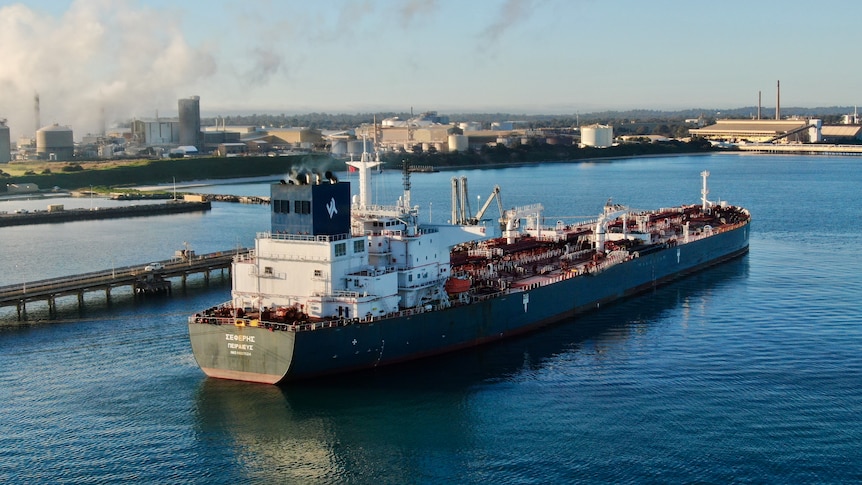Nick Grimm: In a move that could signal a significant deterioration in relations between the US and India, Donald Trump says he’ll impose 25% tariffs on its goods, along with an unspecified penalty on the country for purchasing Russian oil and weapons. The threat adds to pressure from European nations seeking to crack down on those flouting sanctions against Russia and helping to fuel its war in Ukraine. It also comes amid concerns here that Australia is itself aiding Russia’s effort to evade international sanctions. An oil tanker berthed at Kwinana in Western Australia is currently unloading fuel from a refinery in India that’s believed to contain Russian-sourced crude oil. Dr John Coyne is the Director of National Security Programs at the Australian Strategic Policy Institute. He joined me earlier. John Coyne, so this ship that’s berthed in WA at the moment is Greek flagged, carrying fuel refined in India, but the oil itself, well, that might have originated from Russia.
John Coyne: Look, that’s right. So what we do know is this, is where that liquid fuel, so where that diesel originated from is from a refinery in India where approximately 50% of its crude oil feedstock originates out of Russia. But again, to put people’s minds at ease, nothing of this is illegal per se. So the diesel that is being unloaded is diesel that has been purchased legally that doesn’t break any sanctions. The Greek flagged ship that has moved the diesel from India to Australia has not broken any sanctions. And the Indian government does not have sanctions on Russian crude oil. That’s why this whole issue is not so much one of legal debates. It’s one of morals and ethics. And for Australia and Australians, are we really happy with the idea that money from Australia is going into the coffers of Moscow and being used to fund a campaign in Ukraine that is targeting not just military targets, but destroying a nation. And will inevitably be funding Russia’s campaign in Ukraine.
Nick Grimm: So how is this loophole, as it were, how has it come about?
John Coyne: Look, there is in our sanctions regime, we have a cut out and the cut out sort of goes along the lines in a very lay person’s terms that we will not take Russian crude oil. Now bearing in mind about 80 to 90% of our liquid fuels in Australia are imported, refined to Australia. So we have limited refinery capability. And the cut out says that if Russian crude oil is processed in a third country and significantly value added, then it is not subject to the sanctions regime.
Nick Grimm: Now if the United States is going to crack down on India trading with Russia and purchasing its crude oil, what’s that likely to mean?
John Coyne: Look, there’s likely there to be more pressure on Australia to do exactly the same thing. And that pressure is not just about Trump. That pressure is also going to come out of the UK and EU. And so, you know, there will be some big questions now asked, do we change that cut out? And what will be the impacts of that in terms of fuel security, price, and finally in relationships with India? Now in terms of fuel security, I don’t think that’s an issue. We source a very small amount from India. And so we can find alternative supplies. In terms of fuel price, well, at the pump in the interim, I don’t see that will impact it. There is a real potential that at a global level, the price of fuel may increase. But certainly the big issue at hand will be how the Indian government responds to that. Now, for the Australian government, that is a problem. You know, we have increasingly stronger bilateral ties to India. And moreover, you know, we’re putting a lot of effort into the quadrilateral relationship. And so this won’t be an easy path to navigate.
Nick Grimm: John Coyne, thanks very much for talking to us.
John Coyne: My pleasure.
Nick Grimm: And Dr Coyne is the director of national security programs at the Australian Strategic Policy Institute.

